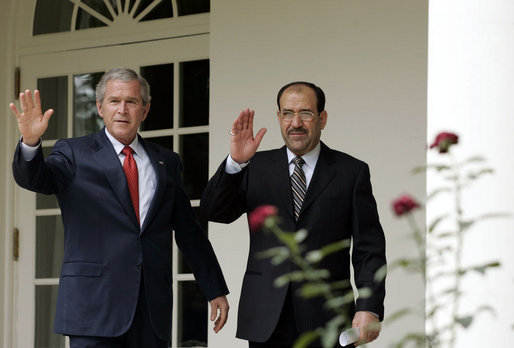Fouad Ajami in the Wall Street Journal, glossing over his predictions of late 2010 --
On the face of it, the similarities of the undoing of the terrible regimes of Saddam Hussein and Moammar Gadhafi are striking. The spectacles of joy in Tripoli today recall the delirious scenes in Baghdad's Firdos Square in 2003—the statues pulled down, the palaces of faux grandeur and kitsch ransacked by people awakening to their own sense of violation and power, the man at the helm who had been full of might and bravado making a run for it, exposed as a paranoid and pretender, living in fear of his day of reckoning.
In neither case had the people of these two tormented societies secured their liberty on their own. In Baghdad, the Baathist reign of terror would have lasted indefinitely had George W. Bush not pushed it into its grave.
So, Saddam would have lasted forever without the Bush invasion, even as we now know that Arabs can get rid of seemingly well-entrenched dictators with much more selective foreign help? Perhaps realizing the contradiction, the rest of Ajami's article is a narrative of how Libya's neighbours were much more well inclined to regime change than Iraq's. Er ... Iran? Which requires him to dance between claiming that Iran regressed into a historical Persian rivalry with Iraq while Saudi Arabia failed to embrace Iraqi regime change because they saw it as inspired by ... Iran!
On the face of it, the similarities of the undoing of the terrible regimes of Saddam Hussein and Moammar Gadhafi are striking. The spectacles of joy in Tripoli today recall the delirious scenes in Baghdad's Firdos Square in 2003—the statues pulled down, the palaces of faux grandeur and kitsch ransacked by people awakening to their own sense of violation and power, the man at the helm who had been full of might and bravado making a run for it, exposed as a paranoid and pretender, living in fear of his day of reckoning.
In neither case had the people of these two tormented societies secured their liberty on their own. In Baghdad, the Baathist reign of terror would have lasted indefinitely had George W. Bush not pushed it into its grave.
So, Saddam would have lasted forever without the Bush invasion, even as we now know that Arabs can get rid of seemingly well-entrenched dictators with much more selective foreign help? Perhaps realizing the contradiction, the rest of Ajami's article is a narrative of how Libya's neighbours were much more well inclined to regime change than Iraq's. Er ... Iran? Which requires him to dance between claiming that Iran regressed into a historical Persian rivalry with Iraq while Saudi Arabia failed to embrace Iraqi regime change because they saw it as inspired by ... Iran!



